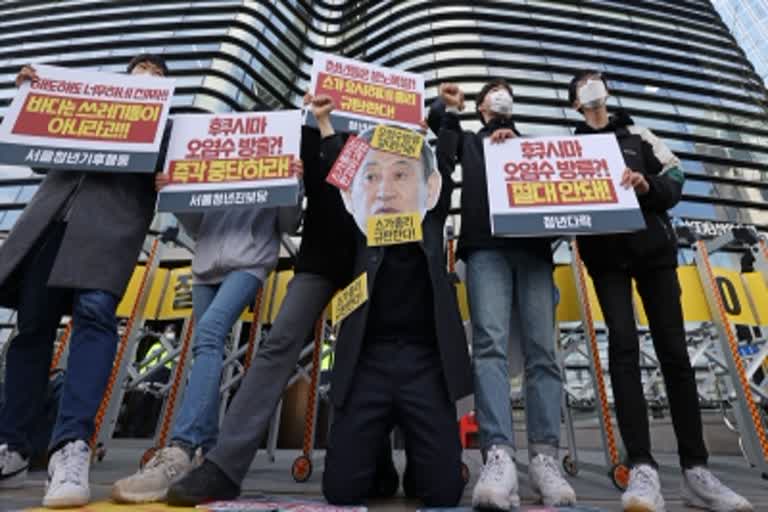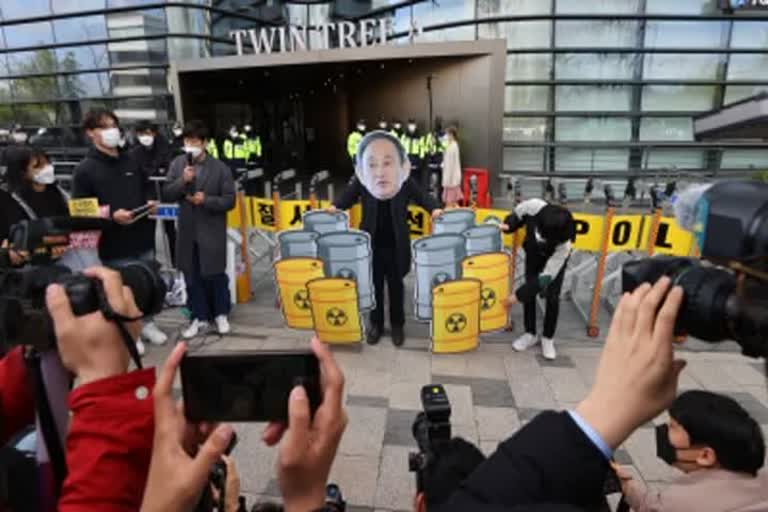Tokyo: The Japanese government on Tuesday announced its decision to start releasing radioactive water accumulated at the damaged Fukushima nuclear plant into the sea after treatment, amid domestic and international opposition.

Prime Minister Yoshihide Suga's cabinet decided on Tuesday morning, which comes a decade after the nation's worst-ever atomic disaster at the Fukushima Daiichi Nuclear Power Station, reports DPA news agency.
The operator said the space for tanks will be running out in 2022, though local officials and some experts say otherwise.
Read:| Nuclear watchdog backs release of contaminated Fukushima water
The plant suffered meltdowns at three of its six reactors after it was hit by a powerful earthquake and ensuing tsunami in March 2011.
Since then, the operator has continued to inject water into the three reactors to keep cooling melted atomic fuel there.
Radiation-contaminated water at the site has been treated through an advanced liquid processing system, but tritium, a radioactive isotope of hydrogen, cannot be removed.
The government and the operator say tritium is not harmful to humans in low concentration.
However, the Tokyo-based Citizens' Commission on Nuclear Energy said in a statement that the government "should strictly avoid releasing tritium into the environment as tritium is still radioactive material".
The group, which includes several experts, rejected the government's plan to release radioactive water into the ocean and instead proposed mortar solidification technology and a land-based storage system, using large tanks.
Read:| Safety of Fukushima waste water focus of sea release debate
The group submitted the proposals to the Industry Ministry and held news conferences repeatedly.
However, the Ministry and Japanese media downplayed and ignored them, it said.
The government's plan has also invited criticism and strong opposition at home and abroad.
Hiroshi Kishi, head of the Japan Fisheries Cooperatives, said the release is "totally unacceptable. We lodge a strong protest".
Greenpeace Japan said the group "strongly condemns" the government's decision as it "completely disregards the human rights and interests of the people in Fukushima, wider Japan and the Asia-Pacific region".
South Korea's Foreign Ministry called in Japanese Ambassador to South Korea Koichi Aiboshi and lodged a protest over Tokyo's decision, Japan's Kyodo News reported.
Koo Yun Cheol, South Korea's minister for government policy coordination, said Seoul "firmly opposes" the move, according to Kyodo.
Read:| Fresh quake rattles Japan's Fukushima
China expressed concerns on Monday in anticipation of the decision.
"China has expressed grave concern to the Japanese side through the diplomatic channel, urging Japan to handle the issue of wastewater disposal from the Fukushima nuclear power plant prudently and responsibly," Beijing's Foreign Ministry spokesman Zhao Lijian said.
The US State Department, however, issued a statement saying Japan "has been transparent about its decision, and appears to have adopted an approach following globally accepted nuclear safety standards".
IANS
Read:| Japan's 1000-year-old waterfall cherry tree attracts nature lovers



